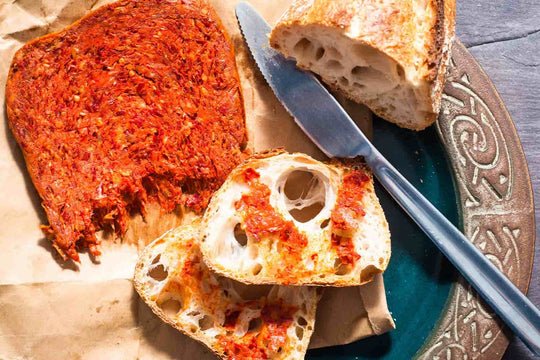
Nduja, 180g
Description
Nduja is a cross between a spicy, hot pâté and a spreadable salami – meaning that it has, unsurprisingly, developed a cult following. Its popularity shows no signs of slowing as people are embracing the meaty, spicy, umami flavours of this unique ingredient. This variety is made in the municipality of Spilinga, where it is a Calabrian speciality.
Chef Francesco Mazzei, of Santini, L’Anima and Sartoria fame, first introduced the UK to ‘nduja back in 2006. He was determined to give his home speciality the recognition it deserved, and we’re very glad he succeeded!
What is 'Nduja?
- Italian spreadable salami
- Smoky, spicy, umami flavour
- Rich with a red pepper kick
- Smooth texture, stir through pasta sauce
- Add to pizzas with mozzarella and tomato
How do I cook with 'Nduja?
Nduja has a smooth texture and strong taste. The traditional Calabrian way is to spread nduja on a piece of crusty bread, perhaps with some cheese. But be warned - the strong flavours are only for those with a chilli-hardened palate!
A little nduja goes a long way. Just one teaspoon really livens up a tomato sauce for a quick pasta dish. Nduja is also delicious with seafood, particularly in a crab linguine. Or dollop it sparingly over a pizza with lots of mozzarella, fresh spinach and sundried tomatoes.
What is 'Nduja made of?
'Nduja is primarily made from pork meat and fat, generously spiced with fiery red peppers for heat and flavor. Salt is added for preservation and to enhance the taste. This mixture is finely ground, allowed to ferment, and then aged to develop its characteristic soft, spreadable texture and robust flavor.
Is 'Nduja the same as chorizo?
'Nduja and chorizo are both spicy pork sausages, but they differ significantly in texture and preparation. Nduja is a soft, spreadable sausage from Italy, known for its extremely spicy taste and creamy texture, made from a mixture of pork, fat, and Calabrian chili peppers. Chorizo, on the other hand, is a firmer sausage from Spain or Latin America, typically flavored with paprika and garlic, and can be either cured and sliced or cooked fresh.
Read our guide to 'nduja to learn more, or check out our cured meat & charcuterie collection here.
Product formulations and details may change. For the latest ingredients and allergen information always check product packaging prior to consumption. Ingredients: Fat and pork meat, peppers (30%), salt (no preservatives, artificial colours or flavours).
Storage: Keep in a cool place. Once opened, refrigerate and consume within 30 days.
-
Origin: Italy
-
Size: 180g
-
Best before: 17 January 26
-
SKU: PL0004
-
Minimum shelf life: 6 months
-
Categories:
Antipasti Bestsellers Chef Top Picks Cured Meat & Charcuterie European Sauces & Condiments Foodservice Gurdeep Loyal's Top Picks Italian Food & Ingredients Luxury Salami Pesto & Pasta Sauce Picnic Essentials Pizza Ingredients Pizza Making Sauces & Condiments Tim Anderson's Top Picks
Delivery
| Delivery Option | Price |
|---|---|
| EVRi ? | £4.50 or FREE for orders over £60 |
| DPD Express ? | £7 or FREE for orders over £100 |
| DPD Signature Required ? | £7 or FREE for orders over £60 |
| DPD Saturday or Sunday ? | £9 or FREE for orders over £150 |
Disclaimer
These summary details have been prepared for information purposes only, and are designed to enhance your shopping experience on the Sous Chef website. While we have taken care in preparing this summary and believe it is accurate, it is not a substitute for your reading the product packaging and label prior to use. You should note that products and their ingredients are subject to change.
FAQs
What is 'nduja?
'Nduja is a Calabrian specialty. It’s thought to have been first introduced by the Spanish, as the pork spread is rich with smoky, red pepper flavours. South Italy is now famous for its ‘nduja production, though – especially the municipality of Spilinga, where this variety is made.
Nduja is also related to Tuscan soppressata – an uncured salami made primarily with left over parts of the pig after the choicer cuts have been used. The head is traditionally the main ingredient in both soppressata and ‘nduja, but don’t let this put you off! The salami is rich and meaty, and the hefty dose of red pepper in ‘nduja gives it a strong chilli kick and even a kind of smokiness.
What are some recipes I can make using 'Nduja?
- Nduja Hot Dog – ‘nduja butter, cheese & marjoram turn the humble hot dog into the talk of the town
- Nduja Spaghetti with Wild Garlic – a quick weeknight dinner that explodes with flavour
- Eggs Benedict with Nduja Hollandaise – your new weekend favourite, and the nduja-spiked hollandaise is sure to make an appearance on other dishes, too…
Is nduja similar to chorizo?
While nduja and chorizo both have spicy, umami flavours, the texture of each is very different. Nduja is a cross between a hot pâté and a spreadable salami, whereas chorizo is a type of sausage with a firm texture.
Can you eat raw nduja?
You can eat nduja raw – we’d suggest spreading it onto a piece of crusty bread, perhaps with some cheese. Alternatively, stir nduja through spaghetti or dot it over pizza. Nduja is very punchy, so use it sparingly.













